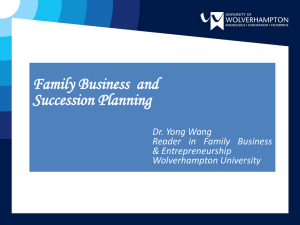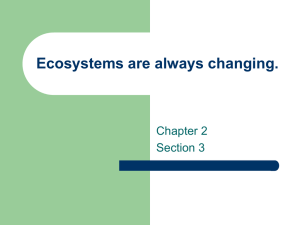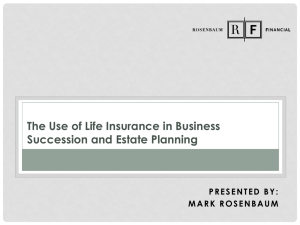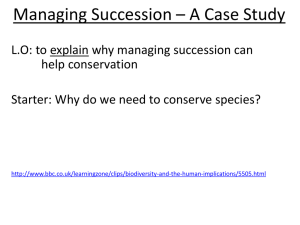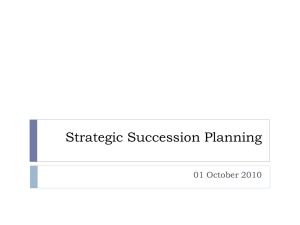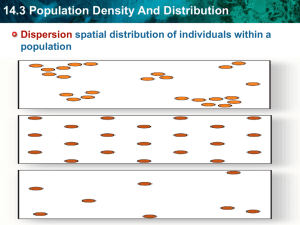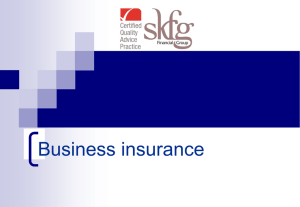Greg-Cusack - Premium Wealth Management
advertisement
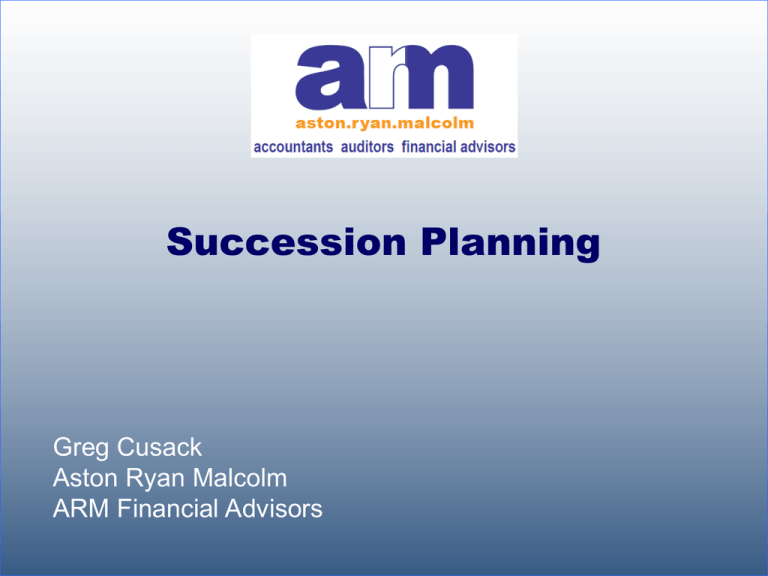
Succession Planning Greg Cusack Aston Ryan Malcolm ARM Financial Advisors Succession Planning Options for outgoing shareholder • Sell External • Sell Internal • Combination of both Focus today on Internal transfer of shares… Succession Planning A potential change of ownership impacts everyone….. • Existing Partners/Shareholders • Managers & Staff • Clients • Banks Succession Planning Considerations – Outgoing Shareholder • What are their expectations? • What is their timeframe? (immediate or gradual exit?) • Will they remain in the business post sale? Succession Planning Considerations – Incoming Shareholder • Who are they? • What are their expectations and needs? • Are they a good fit? • How will other staff react? • Are they able to fund a purchase? • What are their future plans? • How many shares would be offered? Succession Planning Considerations – Other • What type of valuation model is applied? • What does the existing shareholder agreement allow for? • Is the offer attractive and fair to all parties? • Can the business assist with funding? Under what terms? • Partners Salaries – At what point will new shareholder be entitled? • What are the new shareholders voting rights? • How many shareholders do you want? “too many cooks…” • Will shareholders personalities match or clash? • Directorships? Succession Planning Valuation Model - Sample Tangible Assets • Cash + Debtors – Long Term Debt – Staff Entitlements Intangible Assets • Goodwill (varying methods of calculation) • Less Discount?? • Accounting Practices – cents per dollar turnover • Financial Planning – multiple of recurring income/EBIT Note – All practices have differing circumstances which makes no set formula possible. Succession Planning Example 1 – Gradual Sale Share Available – 40% over 4 years ($1,200,000) • Offer 2 x Senior Managers – 20% each over 4 years in 5% tranches • Funding – 50% from Business & Balance Self Funded • Funding from business P & I – 7 years • Price of each parcel purchased depends on annual valuation • Partners Salary Package when 20% equity is reached • Profit – 50% paid as dividend, 50% invested back into business. Succession Planning Gradual Sale – Challenges / Road Blocks Funding - Generation X • Own Mortgage • Available Equity to borrow additional $300,000 • Available Cash Flow – To repay total borrowings (6.5% pa) over 7 years cash return on investment would need to be approx 18% per annum or there would be negative impact on personal cashflow ($8,900 p/mth for $600,000 loan). • Incoming Shareholder – ‘The more profitable I make the business, the more I have to pay for my share’ • After one year, exiting partner may have diluted shareholding <20% therefore no Partners Salary – Better off selling in one tranche – 4 years time and get partners salary. Succession Planning Example 2 – Share Options Share Available – 40% over 4 years ($1,200,000) • Offer 2 x Senior Managers – Provided options to purchase 20% over 4 years – Option expires in 4 years • Exercise price set at start (not future valuation) i.e $600,000 = 20% • Funding – 50% from Business & Balance self funded • Funding from business – I/O – 2 years P & I – 5 years • Business Guarantees Dividend meets interest for first 2 years. • Partners Salary Package when 20% equity is reached • Profit – 50% paid as dividend, 50% invested back into business (subject to dividend guarantee) Succession Planning Share Options – Challenges / Road Blocks Funding - Generation X • Own Mortgage • Available Equity to borrow additional $300,000 If incoming shareholder exercises option in 4 years then has had the opportunity to increase the value of the business therefore decrease need for borrowings. E.g Exercise Price of $600,000 for 20%, Business grows to valuation of $880,000 then 50% business borrowed = $440,000 therefore self fund of $160,000 (Depending on current shareholders) • Available Cash Flow – To repay total borrowings (6.5% pa) over 7 years cash return on investment would need to be approx 18% per annum or negative impact on personal cashflow ($8,900 p/mth for $600,000 loan). If incoming shareholder exercises option in 4 years @ 20% would then have entitlement to Partners Salary which increases cashflow. 2 year interest only with a Guarantee may be an incentive for manager to buy in due to reduced impact on cashflow initially. Succession Planning Sample 2 – Challenges / Road Blocks • Incoming Shareholder – ‘The more profitable I make the business, the more I have to pay for my share’ Now = The more profitable I make the business the more equity in my shares I will have in 4 years. • After one year, exiting partner may have diluted shareholding <20% therefore no Partners Salary Exiting Partner maintains partners salary and probably increased dividends as incoming shareholders incentivised to improve valuation/profitability. Succession Planning Summary • Different succession models suit different practices • Cultural is important consideration • Funding can be the biggest Roadblock • Plan well in advance – 3 - 5 years Succession Planning Questions
